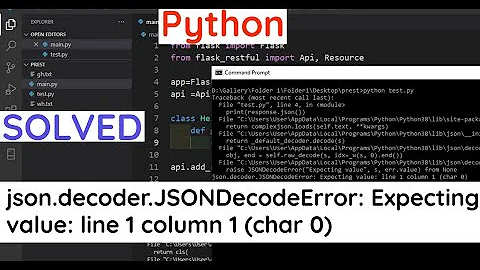Encounter: json.decoder.JSONDecodeError: Expecting value: line 1 column 1 (char 0)
The problem is this piece of code:
with open(new_path) as data_file:
data = data_file.read()
print(data)
data_content = json.load(data_file)
You are reading the contents of the file into data, printing it, and then asking json.load() to read from the filehandle again. However at that point, the file pointer is already at the end of the file, so there's no more data, hence the json error: Expecting value
Do this instead:
with open(new_path) as data_file:
data = data_file.read()
print(data)
data_content = json.loads(data)
You already have your data read into data, so you can just feed that string into json.loads()
Related videos on Youtube
ACuriousCat
Updated on July 06, 2021Comments
-
 ACuriousCat almost 3 years
ACuriousCat almost 3 yearsI got the
json.decoder.JSONDecodeError: Expecting value: line 1 column 1 (char 0)when I tried to access to the values from a json file I created. I ran the runfile below, and it seems that there was this decoder issue, however, when the json file was created, I made the encrypted content, which is supposed to be added to the json file's dictionary, as string. Could someone help me to spot where the problem is?Error is:
{ "youtube": { "key": "D5IPLv06NGXut4kKdScNAP47AieP8wqeUINr6EFLXFs=", "content": "gAAAAABclST8_XmHrAAfEbgrX-r6wwrJf7IAtDoLSkahXAraPjvoXeLl3HLkuHbW0uj5XpR4_jmkgk0ICmT8ZKP267-nnjnCpw==" }, "facebook": { "key": "YexP5dpgxwKhD8Flr6hbJhMiAB1nmzZXi2IMMO3agXg=", "content": "gAAAAABclST8zSRen_0sur79NQk9Pin16PZcg95kEHnFt5vjKENMPckpnK9JQctayouQ8tHHeRNu--s58Jj3IPsPbrLoeOwr-mwdU5KvvaXLY-g6bUwnIp4=" }, "instagram": { "key": "ew2bl0tKdlgwiWfhB0jjSrOZDb41F88HULCQ_21EDGU=", "content": "gAAAAABclST8FKcZqasiXfARRfbGPqb3pdDj4aKuxeJoRvgIPbVIOZEa5s34f0c_H3_itv5iG1O7u8vvlT8lAPTgAp3ez8OBh4T2OfBG-ObljYmIt7exi0Q=" } } Traceback (most recent call last): File "C:\Users\YOURNAME\Desktop\randomprojects\content_key_writer.py", line 65, in <module> main() File "C:\Users\YOURNAME\Desktop\randomprojects\content_key_writer.py", line 60, in main data_content = json.load(data_file) File "C:\Users\YOURNAME\AppData\Local\Programs\Python\Python37\lib\json\__init__.py", line 296, in load parse_constant=parse_constant, object_pairs_hook=object_pairs_hook, **kw) File "C:\Users\YOURNAME\AppData\Local\Programs\Python\Python37\lib\json\__init__.py", line 348, in loads return _default_decoder.decode(s) File "C:\Users\YOURNAME\AppData\Local\Programs\Python\Python37\lib\json\decoder.py", line 337, in decode obj, end = self.raw_decode(s, idx=_w(s, 0).end()) File "C:\Users\YOURNAME\AppData\Local\Programs\Python\Python37\lib\json\decoder.py", line 355, in raw_decode raise JSONDecodeError("Expecting value", s, err.value) from None json.decoder.JSONDecodeError: Expecting value: line 1 column 1 (char 0)The original codes are pasted here, name this as the runfile:
import sys import os from cryptography.fernet import Fernet import json import pathlib from encipher_decipher import encrypt, decrypt, bytes_to_str, str_to_bytes def content_key_writer(path, filename, account, content): """Generate key corresponding to an account, save in json""" # make the path a Path object path = pathlib.Path(path) file_path = os.path.join(path, filename) # generate a key using Fernet key = Fernet.generate_key() # json doesn't support bytes, so convert to string key = bytes_to_str(key) # with file_path, see if the file exists if not os.path.exists(file_path): # build the dictionary to hold key and content data = {} data[account] = {} data[account]['key'] = key data[account]['content'] = encrypt(content, key) # if the file doesn't exist, build the new json file with open(file_path, 'w') as f: json.dump(data, f) else: # if the file does exist with open(file_path, 'r') as f: data = json.load(f) data[account] = {} # <--- add the account data[account]['key'] = key data[account]['content'] = encrypt(content, key) os.remove(file_path) # <--- remove the file and rewrite it with open(file_path, 'w') as f: json.dump(data, f, indent=4) def main(): path = "C:/Users/YOURNAME/Desktop/randomprojects" name = 'content.json' account = 'youtube' content = 'youtubepassword' account2 = 'facebook' content2 = 'facebookpassword' account3 = 'instagram' content3 = 'instagrampassword' content_key_writer(path, name, account, content) content_key_writer(path, name, account2, content2) content_key_writer(path, name, account3, content3) new_path = os.path.join(pathlib.Path(path),name) with open(new_path) as data_file: data = data_file.read() print(data) data_content = json.load(data_file) value = data_content['youtube']['content'] print(value) if __name__ == '__main__': main()The module imported in the codes above is encipher_decipher:
""" Given an information, encrypt and decrypt using the given key """ from cryptography.fernet import Fernet import os def encrypt(information, key): """encrypt information and return as string""" f = Fernet(key) information_bytes = str_to_bytes(information) encrypted_info = f.encrypt(information_bytes) #<--- returns bytes encrypted_info = bytes_to_str(encrypted_info) #<--- to save in json requires str not bytes return encrypted_info def decrypt(information, key): """decrypt information and return as string""" f = Fernet(key) information_bytes = str_to_bytes(information) decrypted_info = f.decrypt(information_bytes) #<--- returns bytes decrypted_info = bytes_to_str(decrypted_info) #<--- converts to string return decrypted_info def bytes_to_str(byte_stuff): """Convert bytes to string""" return byte_stuff.decode('utf-8') def str_to_bytes(str_stuff): """Converts string to bytes""" return bytes(str_stuff, 'utf-8') # or str_stuff.encode('utf-8')-
 ACuriousCat about 5 yearsI tried in the file, using json.loads() returns error, while using json.load() there was no issue. But after using json.load(), I still have problem accessing the values.
ACuriousCat about 5 yearsI tried in the file, using json.loads() returns error, while using json.load() there was no issue. But after using json.load(), I still have problem accessing the values. -
 martineau about 5 yearsTry to create a minimal reproducible example for folks to use to reproduce (and possibly fix) the problem.
martineau about 5 yearsTry to create a minimal reproducible example for folks to use to reproduce (and possibly fix) the problem. -
FastGTR almost 3 yearsTry this stackoverflow.com/questions/5406172/utf-8-without-bom. The json file I was using had BOM information at the header i.e the characters  before the json data started. Had to use an editor to remove BOM then it worked.
-
-
 ACuriousCat about 5 yearsYes, that's true, I also did the same by loads(data_file.read()) and it turns out fine. Thanks a lot.
ACuriousCat about 5 yearsYes, that's true, I also did the same by loads(data_file.read()) and it turns out fine. Thanks a lot. -
 martineau about 5 yearsVery nice catch!
martineau about 5 yearsVery nice catch!




